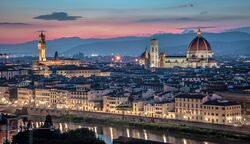Difference between revisions of "Florence"
(basic intro) |
m (Text replacement - "the powerful" to "the influential") |
||
| (2 intermediate revisions by 2 users not shown) | |||
| Line 5: | Line 5: | ||
|map=Florence in the evening.jpg | |map=Florence in the evening.jpg | ||
|coordinates= | |coordinates= | ||
| − | | | + | |description=Has had the same wealthiest families for 600 years |
}} | }} | ||
'''Florence''' (Italian: '''Firenze''') is a city in Central [[Italy]] and the capital city of the [[Tuscany]] [[Regions of Italy|region]]. It is the most populated city in Tuscany, with 383,084 inhabitants in 2013, and over 1,520,000 in its metropolitan area.<ref>Bilancio demografico anno 2013, dati [http://demo.istat.it/ ISTAT]</ref> | '''Florence''' (Italian: '''Firenze''') is a city in Central [[Italy]] and the capital city of the [[Tuscany]] [[Regions of Italy|region]]. It is the most populated city in Tuscany, with 383,084 inhabitants in 2013, and over 1,520,000 in its metropolitan area.<ref>Bilancio demografico anno 2013, dati [http://demo.istat.it/ ISTAT]</ref> | ||
| − | Florence was a centre of [[Middle Ages|medieval]] [[Europe]]an trade and finance and one of the wealthiest cities of that era.<ref>https://web.archive.org/web/20100404082637/http://search.barnesandnoble.com/Economy-of-Renaissance-Florence/Richard-A-Goldthwaite/e/9780801889820</ref> It is considered by many academics<ref>http://www.treccani.it/enciclopedia/tag/firenze-del-rinascimento/ </ref> to have been the birthplace of the [[Renaissance]], and has been called "the [[Athens]] of the [[Middle Ages]]".<ref>Spencer Baynes, L.L.D., and [[William Robertson Smith|W. Robertson Smith]], L.L.D., ''Encyclopædia Britannica''. Akron, Ohio: The Werner Company, 1907: p. 675</ref> Its turbulent political history includes periods of rule by the | + | Florence was a centre of [[Middle Ages|medieval]] [[Europe]]an trade and finance and one of the wealthiest cities of that era.<ref>https://web.archive.org/web/20100404082637/http://search.barnesandnoble.com/Economy-of-Renaissance-Florence/Richard-A-Goldthwaite/e/9780801889820</ref> It is considered by many academics<ref>http://www.treccani.it/enciclopedia/tag/firenze-del-rinascimento/ </ref> to have been the birthplace of the [[Renaissance]], and has been called "the [[Athens]] of the [[Middle Ages]]".<ref>Spencer Baynes, L.L.D., and [[William Robertson Smith|W. Robertson Smith]], L.L.D., ''Encyclopædia Britannica''. Akron, Ohio: The Werner Company, 1907: p. 675</ref> Its turbulent political history includes periods of rule by the influential [[House of Medici|Medici]] family and numerous religious and republican revolutions.<ref>https://archive.org/details/renaissanceflore00bruc_0</ref> From 1865 to 1871 the city was the capital of the [[Italy|Kingdom of Italy]] (established in 1861). The Florentine dialect forms the base of Standard Italian and it became the language of culture throughout Italy<ref>http://www.treccani.it/enciclopedia/storia-della-lingua_(Enciclopedia-dell'Italiano)/ </ref> |
==Same wealthiest families for 600 years== | ==Same wealthiest families for 600 years== | ||
Latest revision as of 13:45, 18 October 2024
(City) | |
|---|---|
 | |
| Subpage(s) | •Florence/Mayor |
| Has had the same wealthiest families for 600 years | |
Florence (Italian: Firenze) is a city in Central Italy and the capital city of the Tuscany region. It is the most populated city in Tuscany, with 383,084 inhabitants in 2013, and over 1,520,000 in its metropolitan area.[1]
Florence was a centre of medieval European trade and finance and one of the wealthiest cities of that era.[2] It is considered by many academics[3] to have been the birthplace of the Renaissance, and has been called "the Athens of the Middle Ages".[4] Its turbulent political history includes periods of rule by the influential Medici family and numerous religious and republican revolutions.[5] From 1865 to 1871 the city was the capital of the Kingdom of Italy (established in 1861). The Florentine dialect forms the base of Standard Italian and it became the language of culture throughout Italy[6]
Same wealthiest families for 600 years
Analysing Florentine tax records dating back to 1427, economists Guglielmo Barone and Sauro Mocetti discovered[7] that the individuals with the highest income in Florence in 2011 had the same surnames as the wealthiest individuals almost six centuries earlier.
Nine hundred of the surnames found in 1427 tax records can still be found today, and there are 52,000 Florentine taxpayers with these surnames.
The wealthiest families in Florence are the same families that sat at the top of the socioeconomic ladder almost 600 years ago. The findings show that changes in wealth and status from generation to generation in Florence were minimal, with little opportunity in Florentine society to move up the socioeconomic ladder.
Group
| Group | Start | Description |
|---|---|---|
| University of Florence | 1859 | University located in Florence, Italy |
References
- ↑ Bilancio demografico anno 2013, dati ISTAT
- ↑ https://web.archive.org/web/20100404082637/http://search.barnesandnoble.com/Economy-of-Renaissance-Florence/Richard-A-Goldthwaite/e/9780801889820
- ↑ http://www.treccani.it/enciclopedia/tag/firenze-del-rinascimento/
- ↑ Spencer Baynes, L.L.D., and W. Robertson Smith, L.L.D., Encyclopædia Britannica. Akron, Ohio: The Werner Company, 1907: p. 675
- ↑ https://archive.org/details/renaissanceflore00bruc_0
- ↑ http://www.treccani.it/enciclopedia/storia-della-lingua_(Enciclopedia-dell'Italiano)/
- ↑ https://www.independent.co.uk/news/world/europe/florence-rich-families-social-mobility-same-1427-a7056141.html